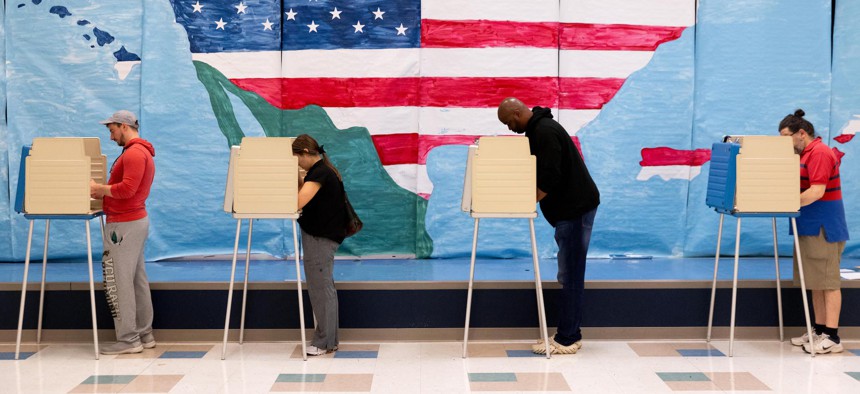How the issue of housing and homelessness factored in state and local elections

Julia Nikhinson/For The Washington Post via Getty Images
It impacted mayoral races, and landed on the ballot as communities debated the merits of homeless encampment sweeps, tax hikes and affordable housing developments.
Communities big and small, urban and rural, blue and red are dealing with the same issue: a nationwide housing shortage that is decimating household budgets and pushing more people into homelessness. So it’s little surprise that concerns around affordable housing and homelessness took center stage during Tuesday’s elections.
“There's just more attention to the issue, more discussion about new policy solutions, more interest in exploring things differently, and recognition that the current policies are not working well,” said Jenny Schuetz, a senior fellow at the Brookings Institution’s Metropolitan Policy Program.
But Tuesday’s results reveal that there is frustration with the issue and little agreement across communities on which policies are most effective in creating safe, stable and affordable housing for all. In some cases, dissatisfaction is leading voters to oust their representatives.
Take, for example, the mayoral races in Maine and Washington.
Homelessness in Spokane, Washington, has increased 50% over the last four years of incumbent Mayor Nadine Woodward’s tenure. The Republican, who won office in 2019 promising to reduce homelessness during her term, branded herself as a “law-and-order” politician, implementing ordinances against public camping, adding new police precincts and creating a violent crime task force. But her lack of results may cost her the job. Woodward’s opponent Democrat Lisa Brown pointed to strategies like bolstering the mental health workforce and building “navigation centers” to help people access city services for health, housing and employment needs. Brown currently leads Woodward, but the race has yet to be called.
A similar race played out in Portland, Maine, though with a different outcome. Mark Dion, who narrowly came out on top after a runoff, also built a campaign around a taking a tough approach to the city’s unsheltered homelessness crisis and supports encampment sweeps. He suggests charging unhoused people with minor crimes for public camping, but said the charges should be dropped if offenders enroll in city services like drug rehabilitation or move into a shelter, the Portland Press Herald reported.
Policies that criminalize homelessness proved popular elsewhere. Back in Spokane, voters overwhelmingly approved a measure that prohibits camping within 1,000 feet of schools, public parks, playgrounds and child care facilities. Similarly, voters in Boulder, Colorado, approved a ballot initiative that pushes the city to remove tents within 500 feet of schools and within 50 feet of sidewalks and bike paths.
Encampment sweeps are the most common approach to limiting the number of people who appear to be living in public spaces. Reducing visible homelessness is a common campaign promise, Schuetz said, but dismantling encampments does little to address the issues that push people to live on the streets.
Research has shown that public assistance programs are more effective than criminalization in reducing homelessness.
“Camping bans are a punitive, harmful approach that merely push people experiencing homelessness out of sight without getting them stably housed,” Diane Yentel, president and CEO of the National Low Income Housing Coalition, tweeted Wednesday evening. “Voters who care about addressing homelessness deserve REAL solutions, not criminalization.”
Often the pressure local officials feel to address homelessness comes from middle-income voters, not people experiencing homelessness, Schuetz noted. The approach officials take to addressing homelessness often depends on whether the focus is on improving the lives of unsheltered people or improving the quality of life of middle-class voters.
“That makes me a little bit nervous, because how you get people off the streets can either be benevolent or not benevolent,” Schuetz said, “and those conversations often don't get had explicitly in the campaign phase.”
In some communities, recognition that housing solutions require quite a bit of capital prompted residents to support tax increases. In Santa Fe, New Mexico, voters approved a “mansion tax” that creates a dedicated stream of funds for affordable housing initiatives by applying a 3% tax to home sales over $1 million. In Phoenix, Arizona, voters supported a $63 million bond to build and preserve affordable housing and improve senior centers. And more than 66% of voters in Seattle, Washington, approved increasing a property tax levy to make $970 million available for affordable housing over the next seven years.
But what voters believe will work in one city may not be reflected in others.
In Cincinnati, Ohio, voters rejected an initiative that would have increased earned income tax to support affordable housing. Opponents to the measure argued it didn’t adequately address the roots of the affordable housing crisis and would further burden residents who are already seeing property taxes increase.
Affordable housing development proposals delivered different results, even in neighboring communities.
In Cambridge, Massachusetts, pro-housing candidates who are pushing for increased density and more affordable developments did well, Schuetz said. Meanwhile, in Boston suburbs like Newton, the same kind of platform was less popular.
“The politics on the local level differ a lot between the renter-heavy communities and the homeowner-heavy communities, which is not especially surprising,” she said. As the housing crisis garners ever more attention, it's difficult to point to the positions that are most likely to win over voters. It doesn’t appear there is an approach that will achieve universal support.
“If you push forward an aggressive pro-housing agenda, is that something voters will reward you for or punish you for?” Schuetz asked. “I think we're still learning.”






